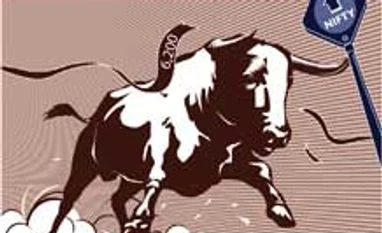An intra-day swing of 740 points on the BSE Sensex after it scaled 25,000 points raises the question of whether the period for earning easy money from the market is over. Frontline as well as small and mid-cap stocks have participated in this rally. There are some experts in the market who believe that we are in the overbought zone and further positions should be taken on corrections.
In an interview with CNBC, Chris Roberts of Asianomics group says that the risk reward is perhaps not as attractive as it used to be in recent weeks. According to Roberts, their technical analysis of the market shows that it has reached an overbought level that was last visited in 2006.
FII data supports the fact that the recent round of buying, especially in the month of May was supported by domestic investors. In March 2014, FIIs pumped in Rs 25,376 crore in the market while the Sensex jumped by 1,334 points from a low of 20,920 to a high of 22,254. In May 2014, FIIs invested half that amount of Rs 12,900 crore but the Sensex has moved from 22,277 to 25,376 points a gain of 3,099 points.
A Morgan Stanley report by Ridham Desai, Sheela Rathi and Utkarsh Khandelwal points out that the stage is set for a return of the retail investor. Financial saving should see a boost in the coming 24 months if the government commits itself to a reduction in inflation, hence a dovish rise in rates, says the report. The share of equities within that could also rise given the improving return of on equities, the report adds.
The 'hope rally' is clearly envisaging better days ahead but it will be some time before company fundamentals match up to these expectation. A JPMorgan report titled 'India's Change of Government: What does it mean for investors' written by Geoff Lewis and Ian Hui says that both Indian voters and equity investors are likely to allow Modi government some time before they expect to see real results, but what they expect without delay is a road map setting out the key measures that the government intends to focus its energy on.
With a clarity on the cabinet ministers, the next big trigger will now be interest rate cuts according to Andrew Holland, CEO, Ambit Investment Advisors. Holland believes that the current market rally has not completely played out yet. A point which is also shared by Chris Roberts who had pointed out that we are in an overbought situation last seen in 2006. Roberts says that in a bull market you see a number of overbought conditions which will be followed by correction of some degree. Even though the overbought signal appeared in 2006, the market did not peak till January 2008.
While the market has clearly enjoyed the 'hope rally' the sharp volatility, fluctuations and churn visible in stocks at current level shows that it is now making way to a fundamental based rally.
In an interview with CNBC, Chris Roberts of Asianomics group says that the risk reward is perhaps not as attractive as it used to be in recent weeks. According to Roberts, their technical analysis of the market shows that it has reached an overbought level that was last visited in 2006.
FII data supports the fact that the recent round of buying, especially in the month of May was supported by domestic investors. In March 2014, FIIs pumped in Rs 25,376 crore in the market while the Sensex jumped by 1,334 points from a low of 20,920 to a high of 22,254. In May 2014, FIIs invested half that amount of Rs 12,900 crore but the Sensex has moved from 22,277 to 25,376 points a gain of 3,099 points.
Also Read
So has the retail investor in India already participated in the rally? With nearly 201 stocks out of 779 in the BSE Mid-Cap and Small-Cap indices gaining 100 per cent and 42 gaining 200 per cent, retail investors have announced their presence. But there is more to come for the retail investor.
A Morgan Stanley report by Ridham Desai, Sheela Rathi and Utkarsh Khandelwal points out that the stage is set for a return of the retail investor. Financial saving should see a boost in the coming 24 months if the government commits itself to a reduction in inflation, hence a dovish rise in rates, says the report. The share of equities within that could also rise given the improving return of on equities, the report adds.
The 'hope rally' is clearly envisaging better days ahead but it will be some time before company fundamentals match up to these expectation. A JPMorgan report titled 'India's Change of Government: What does it mean for investors' written by Geoff Lewis and Ian Hui says that both Indian voters and equity investors are likely to allow Modi government some time before they expect to see real results, but what they expect without delay is a road map setting out the key measures that the government intends to focus its energy on.
With a clarity on the cabinet ministers, the next big trigger will now be interest rate cuts according to Andrew Holland, CEO, Ambit Investment Advisors. Holland believes that the current market rally has not completely played out yet. A point which is also shared by Chris Roberts who had pointed out that we are in an overbought situation last seen in 2006. Roberts says that in a bull market you see a number of overbought conditions which will be followed by correction of some degree. Even though the overbought signal appeared in 2006, the market did not peak till January 2008.
While the market has clearly enjoyed the 'hope rally' the sharp volatility, fluctuations and churn visible in stocks at current level shows that it is now making way to a fundamental based rally.
)